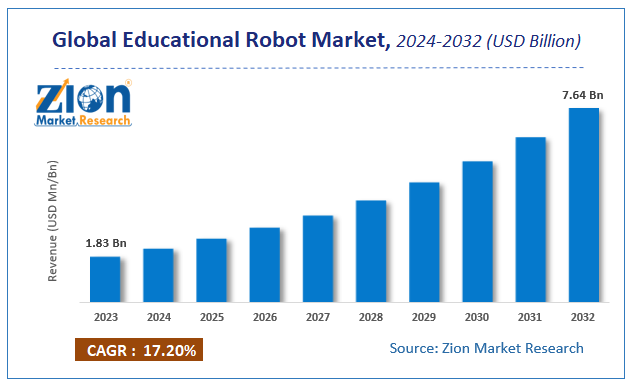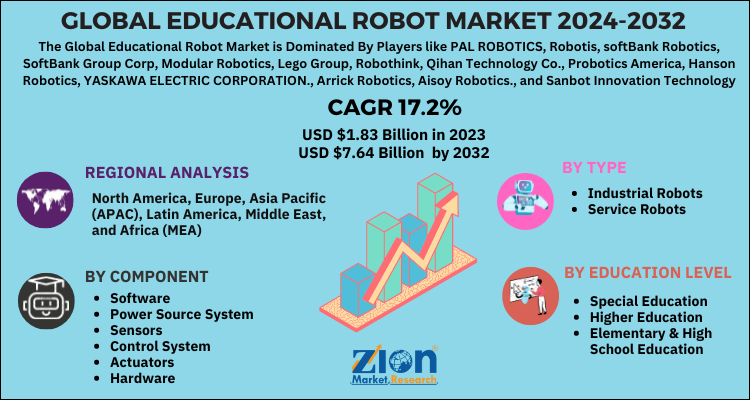Educational Robot Market Size, Share, Trends, Growth 2032

Educational Robot Market By Education Level (Special Education, Higher Education, and Elementary & High School Education), By Component (Software, Power Source System, Sensors, Control System, Actuators, End Effectors, Robotic Arms, Hardware, and Others), By Type (Industrial Robots and Service Robots), And By Region - Global And Regional Industry Overview, Market Intelligence, Comprehensive Analysis, Historical Data, And Forecasts 2024 - 2032-
| Market Size in 2023 | Market Forecast in 2032 | CAGR (in %) | Base Year |
|---|---|---|---|
| USD 1.83 Billion | USD 7.64 Billion | 17.2% | 2023 |
Description
Educational Robot Industry Prospective:
According to the report published by Zion Market Research, the global Educational Robot Market size was valued at USD 1.83 Billion in 2023 and is predicted to reach USD 7.64 Billion by the end of 2032. The market is expected to grow with a CAGR of 17.2% during the forecast period.
The report analyzes the global Educational Robot Market's growth drivers, restraints, and impact on demand during the forecast period. It will also help navigate and explore the arising opportunities in the Educational Robot industry.
Global Educational Robot Market: Overview
Modernization has paved the way for contemporary services and has significantly escalated the connectivity along with other advanced services. With due innovations, the IT sector is flourishing significantly in recent years. Artificial intelligence is one such advanced development that is being adopted by several sectors including construction, automotive, education, and several others. It has significantly assisted human society to prosper in a number of ways and educational robots are one such affluent source. The objective of educational robots is not to replace the teachers but to revamp the whole learning process in order to make it easier and more convenient for students.
Global Educational Robot Market: Growth Factors
The education sector has emerged as one of the promising sectors for the evolution of digitalization in developing and developed regions. Developing regions like Brazil, India, and China are undergoing a massive transformation and thereby causing a huge demand for advanced technology-driven educational techniques. Educational centers in Japan, South Korea, and China are aiming to train their students exceptionally in the digitized world. It is expected that digitalization in the education sector is a primary factor fuelling the growth of the global educational robot market. Robots are updated with the present knowledge landscape & teaching techniques and also the robotic software can be updated anytime very easily with modern methods and knowledge.
Moreover, the growing demand for humanoid robots is further creating several lucrative opportunities in the market. Nowadays, humanoid robots are very much like humans and with the latest technology, they are built to interact with social tools similarly to humans. Human-robot interaction is gaining immense popularity in recent years. Hence, humanoid robots will witness exponential demand in the forthcoming years. Also, it is considered that humanoid robots can reduce frustration, reluctance, and shyness in children by displaying a variety of emotions which in turn will improve their social confidence, self-esteem, and several others.
Moreover, the ongoing technological advancements in the field of humanoid and educational robots are expected to revolutionize the whole learning process and hence will exponentially foster the scope of educational robots globally.
Global Educational Robot Market: Segmentation
The global educational robot market can be segmented into education level, component, type, and region.
By education level, the market can be segmented into special education, higher education, and elementary & high school education. The special education segment accounts for the largest share in the global educational robot market. The growth can be attributed specifically to the use of robots in training children with autism and helping them to gain skills through alternative methods.
By component, the market can be segmented into software, power source system, sensors, control system, actuators, end effectors, robotic arms, hardware, and others. The hardware components segment holds the largest share in the global educational robot market as hardware is the main element of any educational robot.
By type, the market can be segmented into industrial robots and service robots. The service robot segment holds hegemony over others as they are the widely utilized robots in the education system.
Educational Robot Market: Report Scope
| Report Attributes | Report Details |
|---|---|
| Report Name | Educational Robot Market |
| Market Size in 2023 | USD 1.83 Billion |
| Market Forecast in 2032 | USD 7.64 Billion |
| Growth Rate | CAGR of 17.2% |
| Number of Pages | 193 |
| Key Companies Covered | PAL ROBOTICS, Robotis, softBank Robotics, SoftBank Group Corp, Modular Robotics, Lego Group, Robothink, Qihan Technology Co., Probotics America, Hanson Robotics, YASKAWA ELECTRIC CORPORATION., Arrick Robotics, Aisoy Robotics., and Sanbot Innovation Technology |
| Segments Covered | By education level, By component, By type and By Region |
| Regions Covered | North America, Europe, Asia Pacific (APAC), Latin America, Middle East, and Africa (MEA) |
| Base Year | 2023 |
| Historical Year | 2018 to 2022 |
| Forecast Year | 2024 - 2032 |
| Customization Scope | Avail customized purchase options to meet your exact research needs. Request For Customization |
Global Educational Robot Market: Regional analysis
Asia Pacific accounts for the largest share in the global educational robot market as governments in several regions are adopting different initiatives for advancing their education system. Moreover, the technological advancements in the field of education robots are further likely to propel the growth of the regional market in the forthcoming years.
North America is likely to witness a significant growth rate during the forecast period due to the long-term disruptions in the education system as a result of the outbreak of the coronavirus pandemic in the region.
Educational Robot Market: Competitive Analysis
The global educational robot market is led by players like:
- PAL ROBOTICS
- Robotis
- softBank Robotics
- SoftBank Group Corp
- Modular Robotics
- Lego Group
- Robothink
- Qihan Technology Co
- Probotics America
- Hanson Robotics
- YASKAWA ELECTRIC CORPORATION
- Arrick Robotics
- Aisoy Robotics
- Sanbot Innovation Technology
The global educational robot market is segmented as follows:
By Education Level
- Special Education
- Higher Education
- Elementary & High School Education
By Component
- Software
- Power Source System
- Sensors
- Control System
- Actuators
- End Effectors
- Robotic Arms
- Hardware
- Others
By Type
- Industrial Robots
- Service Robots
Global Educational Robot Market: Regional Segment Analysis
- North America
- The U.S.
- Canada
- Europe
- France
- The UK
- Spain
- Germany
- Italy
- Rest of Europe
- Asia Pacific
- China
- Japan
- India
- South Korea
- Southeast Asia
- Rest of Asia Pacific
- Latin America
- Brazil
- Mexico
- Rest of Latin America
- Middle East & Africa
- GCC
- South Africa
- Rest of Middle East & Africa
What Reports Provides
- Full in-depth analysis of the parent market
- Important changes in market dynamics
- Segmentation details of the market
- Former, on-going, and projected market analysis in terms of volume and value
- Assessment of niche industry developments
- Market share analysis
- Key strategies of major players
- Emerging segments and regional markets
- Testimonials to companies in order to fortify their foothold in the market.
Table Of Content
FrequentlyAsked Questions
Contemporary services have been facilitated by modernization, which has also substantially increased connectivity and other advanced services. In recent years, the IT sector has experienced substantial growth as a result of the implementation of appropriate innovations. One such advanced development that is being adopted by a variety of sectors, including construction, automotive, and education, is artificial intelligence.
The education sector has emerged as a prospective sector for the evolution of digitalization in both developed and developing regions. The enormous transformation that is currently underway in developing regions such as Brazil, India, and China has resulted in a significant demand for advanced technology-driven educational techniques. Educational institutions in Japan, South Korea, and China are striving to provide their pupils with an exceptional education in the digital age.
According to the report published by Zion Market Research, the global Educational Robot Market size was valued at USD 1.83 Billion in 2023 and is predicted to reach USD 7.64 Billion by the end of 2032.
The market is expected to grow with a CAGR of 17.2% during the forecast period.
Asia Pacific accounts for the largest share in the global educational robot market as governments in several regions are adopting different initiatives for advancing their education system. Moreover, the technological advancements in the field of education robots are further likely to propel the growth of the regional market in the forthcoming years.
Some of the significant players in the global educational robot market are PAL ROBOTICS, Robotis, softBank Robotics, SoftBank Group Corp, Modular Robotics, Lego Group, Robothink, Qihan Technology Co., Probotics America, Hanson Robotics, YASKAWA ELECTRIC CORPORATION., Arrick Robotics, Aisoy Robotics., and Sanbot Innovation Technology.
HappyClients
Zion Market Research
Tel: +1 (302) 444-0166
USA/Canada Toll Free No.+1 (855) 465-4651
3rd Floor,
Mrunal Paradise, Opp Maharaja Hotel,
Pimple Gurav, Pune 411061,
Maharashtra, India
Phone No +91 7768 006 007, +91 7768 006 008
US OFFICE NO +1 (302) 444-0166
US/CAN TOLL FREE +1 (855) 465-4651
Email: sales@zionmarketresearch.com
We have secured system to process your transaction.
Our support available to help you 24 hours a day, five days a week.
Monday - Friday: 9AM - 6PM
Saturday - Sunday: Closed







